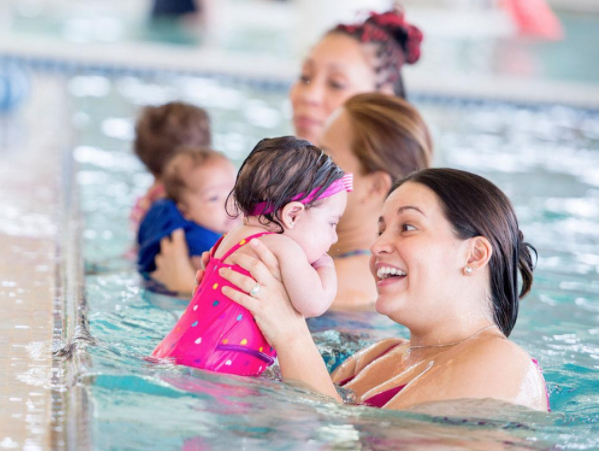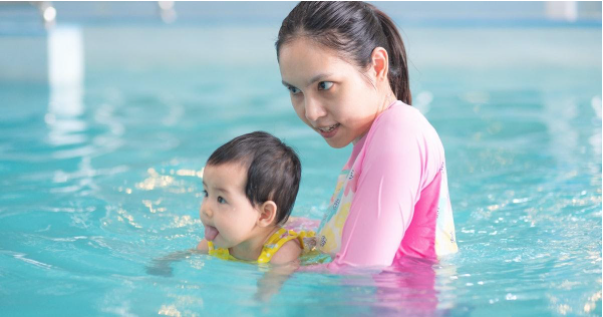Mumeemagic is reader-supported. When you buy through links on our site, we may earn an affiliate commission.
Can Babies Hold Their Breath Underwater?
Did you know that infants are born with the ability to hold their breath underwater? That’s hard to believe, right? As frightening as that might sound, it is true! You might be thinking that it is alarming for babies and toddlers to know swimming or have the ability to hold their breath while being submerged in water.
It works like this – babies up to the age of 6 months whose heads are underwater can naturally hold breath. During this, their heart rate decelerates, which helps them to conserve oxygen. Are you eager to know more about how babies hold their breath underwater? This article will help you demystify it!
Infant Swimming and Diving Reflex
This section of the article will briefly discuss reflexes in newborn babies – the swimming reflex and diving reflex. Babies have this reflex since they can hold their breath underwater. Let’s learn more about swimming and diving reflexes in babies.
Newborns can pick learning movements and safety in the water from the age of just two months. Initially, you should try to help them love water. When you let them in water frequently, they’ll learn how to back float.
Babies typically have two types of reflexes that allow them to swim. The first is their diving reflex. The diving reflex is what triggers the baby to hold their breath when their body touches water. But, this reflex will diminish once the baby turns six months old. As a result, the diving reflex in infants feels so remarkable.
Also, during the diving reflex, the heart rate of the baby decreases by 20%. In babies, the diving reflex typically has an oxygen-conserving effect. The body saves oxygen for the brain and the heart, slowing the onset of hypoxic damage. In a nutshell, you can think of the diving reflex to be an essential defense mechanism for your baby’s body.
The second reflex is the swimming reflex. If you place your tiny tot in the water on its stomach, it’ll start making arm movements. Just like the diving reflex, the swimming reflex will fade as the baby turns older. It is critical to mention that these reflexes are a wider part of a bunch of primitive reflexes spotted in newborns.
NOTE: However, this doesn’t mean you can be carefree when your children less than 6 months old swim. Do not let children as young as six months swim. Take complete care!
Risk of Drowning in Babies
Drowning is one of the leading causes of unintentional death and injuries worldwide. Drowning also happens to be one of the most common injuries among kids aged 1 to 4 years. There is no denying that exposing your sensitive newborn to swimming pools can be a risky move.
Let’s face it, being parents, you might have hiccups sending your little one for swimming lessons. But, with consistent lessons and safety measures, your baby can learn to have their way with swimming. It is better to practice infant swimming with a trained instructor to avoid the risk of drowning.

Image Credits: Babies Using Swimming Reflex During Pool Sessions
Swimming Lesson for Babies
By the time your tiny tot touches the 6-month milestone, they’ll be ready for swimming lessons! You can take them for swimming lessons so that they can continue to work on their swimming skills. Swimming lessons for babies will start with pool games, rollovers, and back float. Once they turn 6-months old, they’ll be comfortable in water and love swimming around.
6-month old babies are perfectly okay to take swimming lessons. So, parents should be ready to have fun at the pool with their little ones. During these swimming lessons, your baby will also pick water safety skills.
Also, children usually enjoy bath time. And, being in a warm pool would just feel like an extension of the bathtime for babies. But, you should not expect your 6-month baby to master techniques like freestyle or breaststroke in the first few years. They’ll build their swimming skills as they progress with their lessons over the years. Babies usually swim, flip over, float, then flip over and swim again.
FAQs
Why Do Babies Not Drown Underwater?
For babies under the age of six months, holding their breath underwater is a natural reflex. Besides, the babies are also born with swimming reflexes. So, when they find themselves in a pool or any other water body, their reflexes get to action.
Do Babies Hold Their Breath Underwater?
If you have ever heard that babies can hold breath underwater, don’t be surprised. Babies under the age of 6 months can hold their breath for a minute underwater. However, the same is not valid for older babies. Also, holding their breath underwater is a natural reflex for babies.
Can I Throw a Baby In a Pool?
Many parents think that they can drown-proof their babies by throwing them into the pool. This comes with a huge risk. When you throw them into the pool, their reflexes might not kick in. It ain’t worth taking the risk. The baby must hold its breath at the right time to survive the dive.
When Can Babies Swim In a Pool?
Most pediatricians and doctors would suggest waiting until your baby turns six months old. You can take a younger baby to your backyard pool. Taking young babies to public swimming pools is not safe as the water might be cold. If you decide to take an infant for swimming, make sure to check the water temperature before the dive!

Image Credits: Introducing Your Infant to Swimming Lessons
The Bottom Line
So, the next time you want to have a pool day with your baby, you can proceed without any worries! But, just because your baby has swimming abilities doesn’t mean you can drop all precautionary measures.
Hopefully, this article has answered your doubts about a baby holding breath underwater.
Related Articles:
Skinny Baby-Should You Be Worried?
How To Avoid Getting Peed On By Baby Boy
Is Aquaphor Safe For Cloth Diapers?



